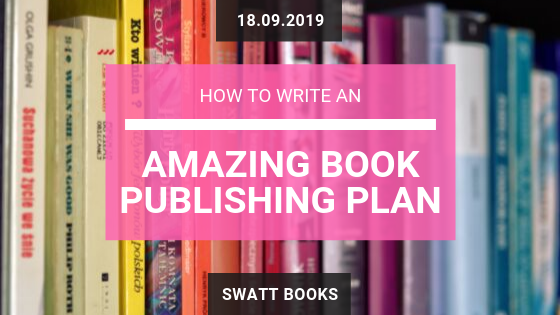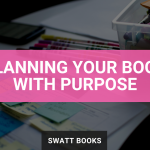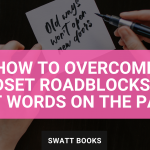I quite often get approached by people who have an idea for a book but don’t know where or how to start. I always refer them to this video of a 4Sight talk I gave back in November 2018 titled “So You Want to Write a Book – Now What?” where I discuss the idea of a Book Publishing Plan. Everyone has always commented on how useful it is, so I’ve decided to convert it into a full-blown blog for you guys.
You can watch the full video here, or scroll down to read the full transcript below.
As you know I’m Sam Pearce from SWATT Books, and I help people to publish. In the past 5 years since I’ve been doing that I have worked with loads and loads of authors – I’ve been privileged to be involved in a publishing of over 40 titles now – and quite often whenever I speak to a lot of those authors they report that at some point in their journey they’ve got stuck. Whether it’s during the writing phase, whether it’s during editing, whether it’s during publishing; something has come along that they either didn’t know what they were doing, didn’t know what was supposed to happen next, or something has come along that’s knocked them off track. And because of that, it can make the writing and publishing process a bit daunting, a little bit scary, and people sometimes wonder “why am I putting myself through this, why am I doing it?”
Today I want to share with you the one biggest thing that will help make the process of writing and publishing a book so much easier, so much more enjoyable, so much simpler to get through from start to finish. I’m not going to kid you, it is still a lot of work, however, if you do this one thing all that work will be a lot less stressful. And that biggest tip is treat your book like a business.
Book Publishing Plan
We’re all business people in this room, we know that when you put time and effort and planning into your business, everything is easier, yeah? Books are no different, and this applies no matter what genre you’re writing for. Whether you’re writing a book to support your business, or whether you’re writing a children’s book, whether you’re writing a novel, writing your biography, memoir, poetry book; it doesn’t matter. Writing a Book Publishing Plan can help anybody publish any book.
What I’m going to do is I’m going to run through basics of what you need to include in a basic Book Publishing Plan. You’ve probably all seen them online before, the simple one-page business plans. It doesn’t need to be anything special; you don’t need war and peace, you don’t need a big heavy business plan that you would prepare to go to your bank, or to get investors. This can be really really simple, and it all falls into answering six really simple questions: Who? What? Where? When? How? and Why? Answer those questions everything else becomes so much easier, so much more straightforward.
Who
So first question: Who? Quite simply, who is your target audience? Who is the main reader that you want to go after? Don’t be afraid to really laser focus this. A lot of people do find this a bit counterintuitive. I fell into this exact same trap when I started my business; I thought that if I laser focus on just those key people, aren’t I ignoring all of this other potential business back here? No, you’re not. When you’re writing a book, and when you publish a book, you’re not preventing anybody from buying your book. The reason why you want to focus on your specific target reader is that they’re your VIPs; they’re the ones that you really, really want to please, the ones you really want to get your message across to. If you know in detail who they are, then you can write for them, you can make sure that your language appeals to them, you can make sure that your content is targeted specifically to them. You’re not preventing anybody else from reading your book, or buying your book, or even enjoying your book. But what you’re doing is you’re making sure that your VIPs are happy.
I would be as detailed about this as you can be. I know some authors that have even gone so far as to give their ideal reader a name, an avatar, what they do for a living, what’s their hobbies, are they married, how many kids have they got, where do they work; all of these things can really help you focus on who you’re writing for.
What
The next question: What? What do you want to tell them? What do you want to say? What does your book need to be about? This can help you flesh out what the actual skeleton of your book is going to be. Once you start really getting into this question, you start building up what your chapters are going to be, what your headings within those chapters are going to be. By doing this, once you get to the point of writing, all you are doing is filling in the blanks. It makes it so much easier if you know from the very beginning exactly what your book is going to contain. Makes the process much simpler.
Where
Next question: Where? So, where do you want your book to be available? Where is your target reader, that you now know specifically who they are, where do they shop? Do they prefer to shop online or do they prefer to go into a book store and leaf through a book? This also helps you decide on where you going to do your marketing. Where do they hang out? Are they social media people or do they prefer face-to-face networking or events?
Answering where also helps you figure out a lot of the logistics in terms of where are you going to market and where you’re going to actually have your book available; which in turn will help you sort out things like distribution contracts.
Why
Next question: Why? This is a really big one! It’s the one that a lot of people leave out, and there are two parts to this. The first why is why should your readers care? Why should your readers buy your book as opposed to somebody else’s who may have written book about the same subject? when you bring this back to a business context this is basically your USP. What makes you as an author unique? What makes your book unique compared to other books in your genre or in your particular subject. What is going to be that one thing is gonna make your readers think “yes I definitely need that book.”
Why is also your why. I’m going to be completely open and honest with you, writing and publishing a book is difficult, there is lots of work involved. There is going to come to a point where you hit a speed bump; it happens on any journey. You’re gonna come across something that’s gonna make you think “oh, why am I doing this? Why am I putting myself through this?” If you know why you’re doing it for your own reasons, it makes it just that little bit easier to get over that hump and get through to the end.
You’re why can be anything, but it needs to be really really specific to you. Do you want to raise your profile? Do you want to use this as a business card to promote your business? Do you want to get speaking engagements? Or is it just about money and you want the royalties? That’s fine if it is by the way because if you do it properly, you can earn money from self-publishing. It doesn’t matter what the reason is, as long as you have a reason, and you know in your head why you’re doing it, it’s gonna make it so much easier when the going gets tough.
How
Next question is how. How is simply logistics. How are you going to publish your book? Are you going to go through a literary agent and try to get yourself a traditional publishing deal, or are you going to self-publish? If you self-publish, are you going to go through a publishing platform like Ingram Spark or CreateSpace and publish print-on-demand, or are you going to self-distribute? Knowing that in advance is going to help you prepare along the way.
How are you going to afford it? If you’re going to self-publish there are costs involved that you’re gonna have to shell out for upfront. If you know in advance what those costs are, then you can start saving for them, start planning for them, making sure that you know where that money’s gonna come from, and then also know how long it’s going to take to recoup that money back at the end.
Also, how are you going to market it? This basically becomes your marketing plan. Where are you going to market? What’s your message going to be? Are you going to pay for marketing or are you going to do free guerrilla marketing? Knowing all of this stuff in advance means you can start marketing it straight away and start building momentum while your book is in production, which can really help with pre-sales and launching your book with a bang.
When
And the final question: when? This is a key one that a lot of authors just completely neglect. Writing takes time. You have to give yourself time to write a book well. And knowing how you write is a really key step. Is it something that you’re just going to build 30-40 minutes a day into your diary? Or do you need time to get going, in which case you need set aside big chunks of time, maybe even taking a writing retreat and taking yourself away on holiday for a couple of days, a weekend, or even a week and just concentrating on absolutely nothing but your book? Knowing how you write, especially if writing doesn’t come naturally to you, is going to make this process just that little bit easier so that you’re catering to the way you work.
This helps you also work out just a general schedule. It helps you figure out how long it’s gonna take you to write a book, so once you start the pre-marketing that I talked about previously, you’ve got an idea in your head as to roughly when your book is going to be available. There is no point building interest if people then come to you and say “that sounds fantastic when can I buy?” for you to answer “oh I don’t know”. If you’ve got an idea, even if it’s months in advance, you can say “I’m not too sure yet, but I’m aiming for March next year.”
Once you’ve got those questions sorted you can actually put a schedule together for yourself. If you’re like me and you need deadlines in order to do something and get something done, having a schedule that’s got actual concrete dates on it is just gonna make it a little bit easier when the going gets tough and you need that extra incentive. By giving yourself deadlines, it just incentivizes you to get it done and actually get it out there.
Conclusion
So putting a Book Publishing Plan together helps for a lot of different reasons. It gives you clarity, and it gives you focus. Those are the two key things that are going to help you get your book over the finish line. But most importantly having a plan is gonna help you overcome those roadblocks that are going to crop up along your journey and helps you get through it.
And I’m speaking about this completely and totally from experience. I’m in the middle of writing and publishing my book now, hoping it’s going to be available about March time but I made the classic mistake of starting my book before I did this. And I got stuck! But I tell you what, as soon I did that Publishing Plan, all of the blocks went away. It doesn’t need to be anything specific. That’s the Publishing Plan for my book. Really really straightforward, just notes scribbled down. The headings are not necessarily the questions that I mentioned, but they answer every single one of those questions.
So, if you were thinking about writing a book, and you’ve got that question in your head of “okay what do I do now?” Do this!






Trackbacks/Pingbacks